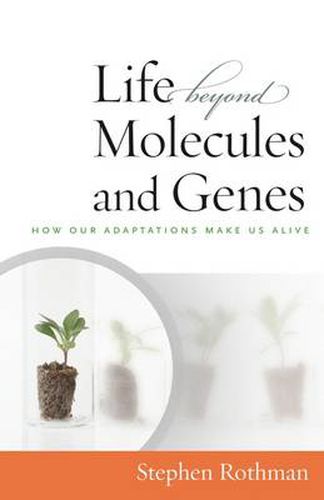Readings Newsletter
Become a Readings Member to make your shopping experience even easier.
Sign in or sign up for free!
You’re not far away from qualifying for FREE standard shipping within Australia
You’ve qualified for FREE standard shipping within Australia
The cart is loading…






What makes us alive? Is it our DNA? Our genetics? Is it our atomic composition that gives us life? Somehow, all of this feels radically dissonant from our everyday experience. In Life beyond Molecules and Genes, experimental biologist Stephen Rothman makes the bold case that it is, in fact, our adaptive abilities, hewn by evolution, that make us alive. In making this point, he reveals a hidden harmony between science and life as we live it.The traditionally accepted understanding of adaptive properties (e.g., the abilities to obtain food, avoid predators, procreate) has been that these are actions of living things or traits that they express. Rothman makes the provocative assertion that this foundational element of the modern materialist perspective is entirely backwards. Our adaptive properties do not exist because we are alive, but rather we are alive because they exist. The implications of this assertion turn the theory of evolution by natural selection on its head by revealing that life transcends its material nature.Students and scholars of the biological sciences as well as those interested in the philosophy of science will find this work both fascinating and challenging, perhaps even controversial. For centuries, the field of biology has focused on the seemingly mundane task of identifying and cataloging life’s chemical substances, while ignoring its grand question: What is it that makes us alive? With Life beyond Molecules and Genes, perhaps the field will move a bit closer toward an answer.
$9.00 standard shipping within Australia
FREE standard shipping within Australia for orders over $100.00
Express & International shipping calculated at checkout
What makes us alive? Is it our DNA? Our genetics? Is it our atomic composition that gives us life? Somehow, all of this feels radically dissonant from our everyday experience. In Life beyond Molecules and Genes, experimental biologist Stephen Rothman makes the bold case that it is, in fact, our adaptive abilities, hewn by evolution, that make us alive. In making this point, he reveals a hidden harmony between science and life as we live it.The traditionally accepted understanding of adaptive properties (e.g., the abilities to obtain food, avoid predators, procreate) has been that these are actions of living things or traits that they express. Rothman makes the provocative assertion that this foundational element of the modern materialist perspective is entirely backwards. Our adaptive properties do not exist because we are alive, but rather we are alive because they exist. The implications of this assertion turn the theory of evolution by natural selection on its head by revealing that life transcends its material nature.Students and scholars of the biological sciences as well as those interested in the philosophy of science will find this work both fascinating and challenging, perhaps even controversial. For centuries, the field of biology has focused on the seemingly mundane task of identifying and cataloging life’s chemical substances, while ignoring its grand question: What is it that makes us alive? With Life beyond Molecules and Genes, perhaps the field will move a bit closer toward an answer.